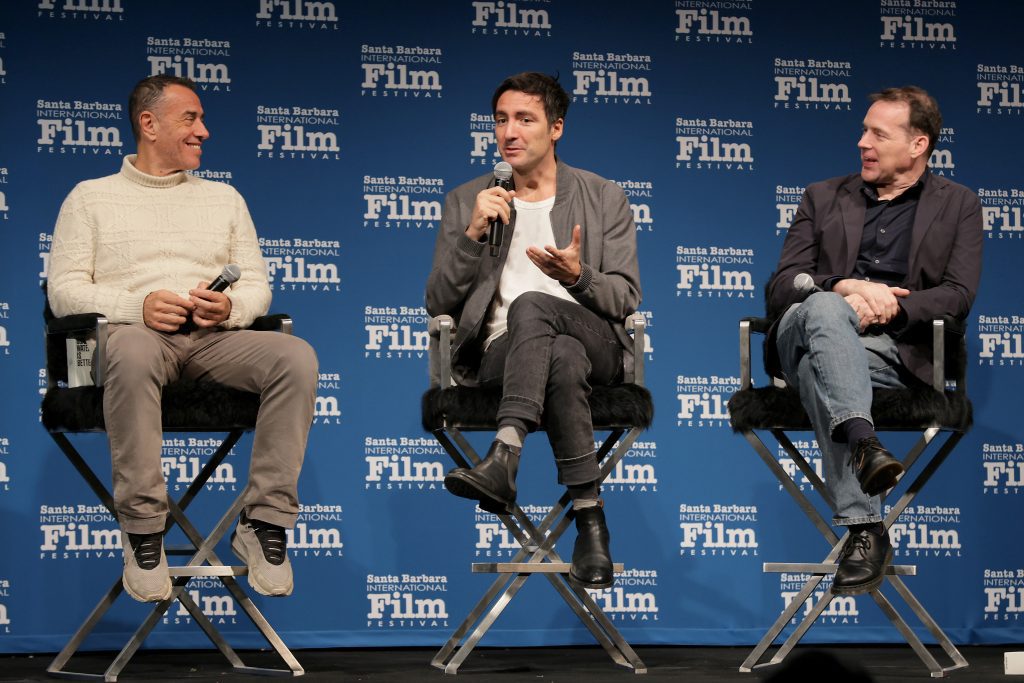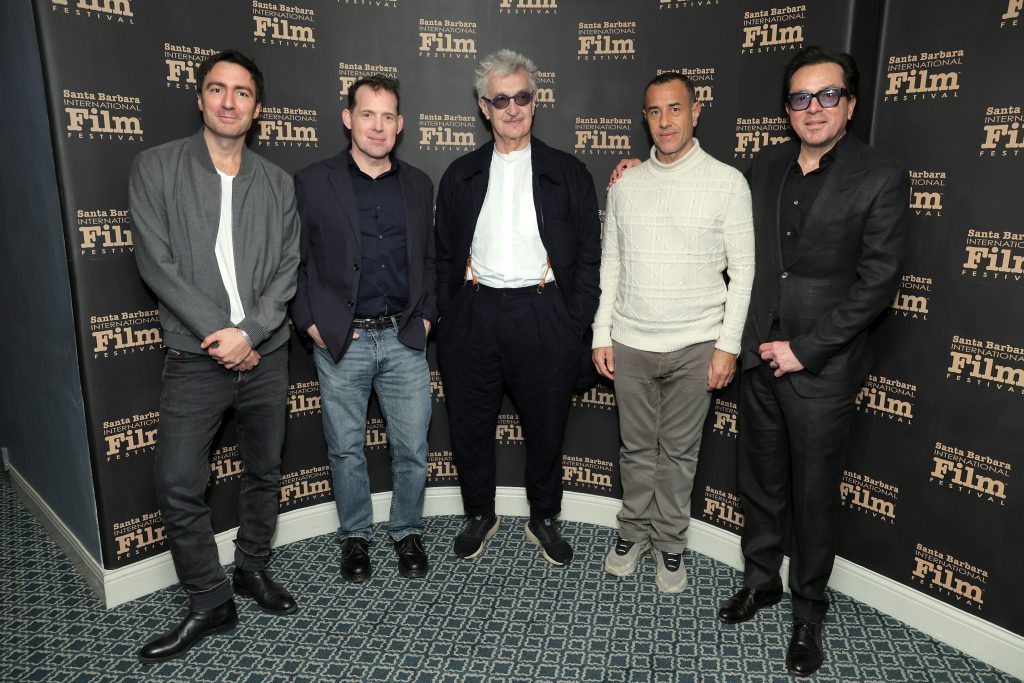A relatively new addition to SBIFF, the International Filmmakers Panel convened Saturday with:
- Ilker Catak (Teachers Lounge) – a Turskish-German director whose German language film follows the clash of teachers and truths when a Polish teacher is accused by a student of stealing
- Matteo Garrone (Io Capitano) – an Italian director whose film is shot in North Africa, in French and Senegalese, and follows the arduous odyssey of two Senegalese migrants seeking to build a better life in Italy
- Johnnie Burn (Zone of Interest) – the British sound designer of the film which is directed by Brit Jonathan Glazer, in German, about a German officer’s seemingly normal, middle class family life just outside a WWII concentration camp
- Wim Wenders (Perfect Days) – the renowned German filmmaker whose film is shot in Japan, in Japanese, about the quiet, ritualistic but immensely satisfying life of a toilet cleaner
The Panel was moderated by SBIFF Executive Director, Roger Durling, whose knowledgeable questions, both about the technical aspects of filmmaking and the subject matter, made for an enjoyable and interesting discussion.
Ilker Catak explicitly acknowledged that his film was an allegory for contemporary society including the erosion of commonly understood truth as opinion has taken over; the rising inability and disinterest in seeking compromise (no one backs down in the film); and the lack of belonging and simultaneous increase in tribalism (whether based on race, gender identity or other characteristics).
Regarding the filmmaking, as Durling observed, each of the multiple characters is distinct, a difficult feat to pull of in a film. The director’s response what that, rather than developing “backstory” to define character, he felt that character is revealed by how you make a decision under pressure. “We don’t need to know what they eat for breakfast.”

Matteo Garone called his film a “reverse shot” since it tells a migrant story from the start of the journey (in Senegal) rather than the usual approach of starting with the arrival of the migrant in the adopted country. He noted that the news stories in Italy about African migrants arriving in boats focus on the number dead and alive after the crossing. He wanted to humanize the numbers and generate empathy for their plight. At the same time, the film is highly cinematic, horrifically gorgeous in places, with magic realist elements. He called his film an “epic adventure and a nomadic fairy tale”.
It was an inventive programming choice to include Johnnie Burn. While Zone of Interest is about domestic life just outside a concentration camp, it never shows life inside the concentration camp. Rather, the horrors of genocide only invade the quiet domesticity through the industrial sounds of the machinery of death (the “horror scape” Burn as called it). He noted, “there are two films, one you see and one you hear” and that sound is emotional whereas visuals are more intellectual. Indeed, a good way to stop your thoughts and have your limbic system take over your executive function is to ask yourself to “what am I hearing?” Ultimately, as he alluded, the film is about our ability to ignore those sounds and, therefore, the suffering of others.

Wim Wenders said his film’s main character had a privileged life but chose to be a toilet cleaner, reveling in the small joys of, for example, playing his ‘80s audio cassettes in the car on the way to work. He buys books one at a time, only buying another when he has finished reading the first. As Wenders noted, “everything he loved, he had” and “he had a friendly view…that all people are alike…from the banker to the shopkeeper”. Given the languid pacing of the film, Durling asked whether its intent was to have the viewer start viewing life in a different way – the medium being the message, perhaps. Wenders responded that the lead character was very content and that “no one has time, he has a lot”. He said the last song, Nina Simone’s “Feeling Good” encapsulated the film. Here is a link Nina Simone – Feeling Good (Official Video) – YouTube
It was a treat to hear from the master, humanist filmmaker who does very little press. He and Garrone had a nice exchange about the difficulties of directing a film in a language you don’t understand.
No one explicitly drew the connection between the themes (the death of truth, the demonization of religious and racial groups, and the horrors of the unchecked fascism that are often their consequence) and their relevance to the United States, right here right now, but it was a strong undercurrent. I guess Wenders role was to just point to a different way. It was a thought provoking afternoon.
The Santa Barbara International Film Festival is a 501(c)(3) non-profit arts and educational organization dedicated to discovering and showcasing the best in independent and international cinema. Learn more at sbiff.org








